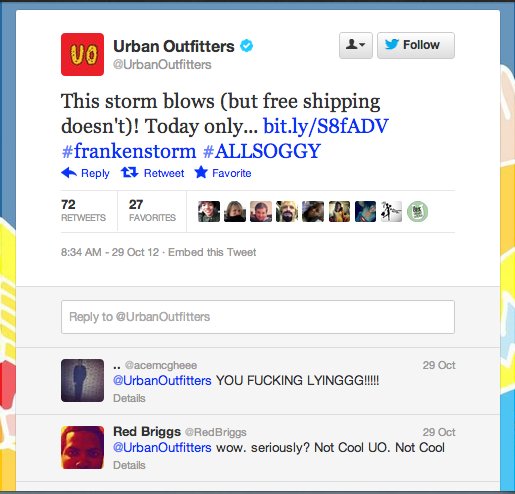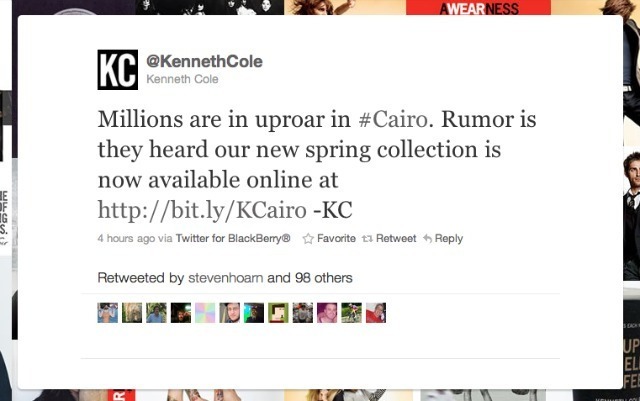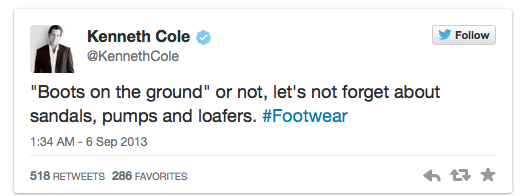Social media has become a powerful tool for businesses to deliver a message to its’ consumers. “Amplification” is one of the elements that are being created through social media (Forbes 2014). However, some of the ethical issues that they face may bring detrimental effects on the brand (Insider 2012). I believe that one of the most significant issues would be the exploitation of others’ misfortune.
These are just some of the unethical tweets where companies use to exploit the misfortune of others for the benefit of gaining publicity. I believe that this strategy undertaken by such companies should be avoided. Companies must be aware that the full control of their brand is no longer in their hands (Forbes 2014). The development of the Web has shifted the power of the brand to its consumers. Even though the “buzz” created may be strong, the brand may be tarnished.
Personally, I feel that it has become a norm for companies to adopt such strategy and only to “apologize” for their “insensitivity” later on. I believe that such occurrences will recur, as there is no law that governs the use of such “insensitive” stunts by companies. Despite the “backlash” some of these companies received from the digital sphere, they are still maintaining the same strategy:
Huffington Post (2013) reveals that Kenneth Cole explained that this was purportedly done to engage consumers. The company even hires a crisis management firm to deal with the “backlash” that it receives. The controversy that is built upon such inappropriate tweets have created the “buzz” and even boosted their company’s performance. It is indeed an upsetting trend.
This issue has clearly taught us that as powerful as how social media can be, some companies may exploit the most out of it regardless of ethics. Once a controversy is sparked, the “amplification” of such tweets may be endless. “#hasjustinelandedyet” is a prime example of such amplification. As we have discussed the issue of “authenticity” in the previous post, it is vital for businesses to understand this concept as well. I do uphold the belief as quoted by Simon Sinek (2009) that “people don’t buy what you do, they buy why you do it”. But when the question of ethics arises, companies will be questioned upon their morality.
References:
Bam, K.F., 2014. The true concept of “Authenticity.” Available at: https://bamsoton.wordpress.com/2014/12/04/the-true-concept-of-authenticity/ [Accessed December 4, 2014].
Forbes, 2014. The Explosive Growth Of Influencer Marketing And What It Means For You. Forbes. Available at: http://www.forbes.com/sites/kylewong/2014/09/10/the-explosive-growth-of-influencer-marketing-and-what-it-means-for-you/ [Accessed December 5, 2014].
HuffingtonPost, 2013. Kenneth Cole: Offensive Tweets Are Simply Good Business Strategy. HuffingtonPost. Available at: http://www.huffingtonpost.com/2013/09/06/kenneth-cole-twitter_n_3881085.html [Accessed December 5, 2014].
Insider, B., 2012. The 9 Biggest Brand Fails Exploiting Hurricane Sandy. Business Insider. Available at: http://www.businessinsider.com/the-9-biggest-brand-fails-exploiting-hurricane-sandy-2012-11?IR=T&op=1 [Accessed December 5, 2014].
Sinek, S., 2009. TED: How great leaders inspire action. Available at: http://www.ted.com/talks/simon_sinek_how_great_leaders_inspire_action?language=en#t-188800 [Accessed December 4, 2014].
The Independent, 2013. PR executive Justine Sacco apologises after losing job over racist Aids “joke” provoked #HasJustineLandedYet Twitter storm. The Independent. Available at: http://www.independent.co.uk/news/people/news/pr-executive-justine-sacco-apologises-after-losing-job-over-racist-aids-joke-provoked-hasjustinelandedyet-twitter-storm-9020809.html [Accessed December 5, 2014].



Hi Khai!
Great perspective on how brand leverage on incidences to gain publicity for themselves.
I also agree with your viewpoint about how the lack of legal backlash has meant that certain companies continue to make insensitive remarks to generate buzz.
Personally for myself, I think it is distasteful to step upon the misfortunes of others for their own gains. However, I will not go to the extent of boycotting the brand if the product that they offer is what I need and enticing. Would you?
Why do you think companies are willing to take the risk knowing that there might be implications and the outcome might also affect the brand reputation, other than the lack of legal action that can be taken? Also, what do you think needs to change before companies will stop such acts?
Let me know your thoughts! 🙂
LikeLike
Appreciate the comment Sara! Firstly, I will start by addressing your second question on why some companies are still insisting on pursing such strategies, despite knowing the implications. Your stand on “not going to the extent of boycotting the brand if the product that they offer is what you need and enticing” is probably one of the reasons for their persistence. A better word would be “complacence”. The fact that these companies have well-established brands, undertaking such strategies will not “put them off the market”. This is where the perception of the control of the brand still holds within the company itself. But as we move towards a new paradigm in the age of social media, companies must be aware of this “shift of power” to the consumers. Personally, I do not know if I would go to the extremes of “boycotting”, but I will not be stunned to find out that the product is not available some day. (This would be a good read on the psychology behind “boycotting” by London Business School).
To address the last question, I feel that the real question of what needs to be changed lies within the companies’ morality. What are they really built upon, which brings us back to the topic on “authenticity”!
I do hope this reply would be useful!
References:
Bam, K.F., 2014. The true concept of “Authenticity.” Available at: https://bamsoton.wordpress.com/2014/12/04/the-true-concept-of-authenticity/ [Accessed December 4, 2014].
Forbes, 2014. The Explosive Growth Of Influencer Marketing And What It Means For You. Forbes. Available at: http://www.forbes.com/sites/kylewong/2014/09/10/the-explosive-growth-of-influencer-marketing-and-what-it-means-for-you/ [Accessed December 5, 2014].
Klein, J.G., Smith, N.C. & John, A., 2003. WHY WE BOYCOTT : CONSUMER MOTIVATIONS FOR BOYCOTT PARTICIPATION AND MARKETER RESPONSES. Available at: http://facultyresearch.london.edu/docs/03-702.pdf.
LikeLiked by 2 people
Great post khai!
I think most businesses, especially well established ones know where their boundaries are and they tend to operate in the grey area. To them bad PR is still a form of publicity they can gain from. Companies also need ensure that their employees are properly trained when handling their social media accounts. Else this might happen:
As an organization that prohibits donators from consuming alcohol before giving blood, that is certainly the wrong message to send across the internet.
LikeLike
Appreciate the comment Isaac! Some of the information gathered from this topic was definitely displeasing. It gives us a good insight on some of the ethical issues both from a business and education perspective. As we embrace the new age of social media, it is imperative to be mindful of our “social etiquettes”. I do believe the importance of this as we are coming to the end of the module. Be it as individuals or representing an organization, we should never disregard such ethics!
LikeLike